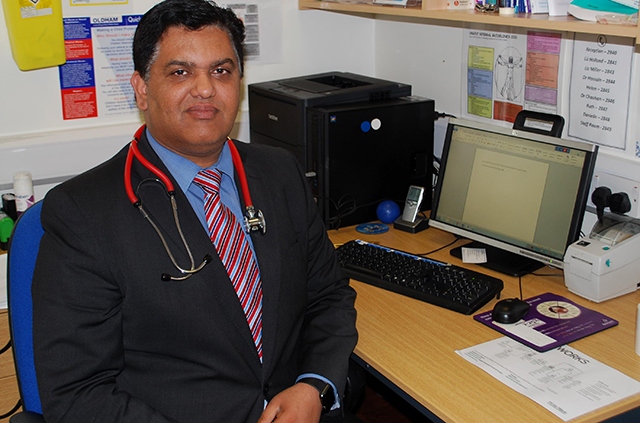Oldham GP - 'Treat any insect bite - fast'
Date published: 26 July 2018

Oldham GP Dr Zahid Chauhan
The continuing warm weather has brought an extra sting to health in Oldham – in the shape of nasty bug bites.
Experts have warned that populations of horseflies and other pests have reached Mediterranean levels and blood-sucking bites have led to increased calls to NHS hotlines.
All of which is adding to the workload of NHS staff beleaguered by cases of heat exhaustion and sunburn – claims Oldham GP Dr Zahid Chauhan.
The national health campaigner has asked people to learn the signs of a sting or bite and visit the pharmacist or get medical support if they begin to feel nauseous or the wound becomes swollen.
Instant treatment like steroid or antihistamine creams could mean they avoid an infection and a dash to the emergency department.
“Most insect bites and stings are harmless and with advice and over-the-counter medication, they disappear within a couple of days” said Dr Chauhan.
"But the unusually high temperatures have meant more bugs like horseflies are around.
"Bites from insects like this last longer, are very painful and itchy and can lead to infections and possibly a hospital stay.
"The best way to avoid that scenario is treat the bite, fast.”
Dr Chauhan advises that should you be stung or bitten, you should:
• Wash the affected area immediately with soap and water
• Keep a cooled flannel, cloth or an ice pack on any swelling for at least 10 minutes and,
• Don’t scratch – you might infect the wound
If you see any of the following signs, it is best to seek medical advice from your pharmacist or ring 111:
• Your symptoms don’t clear up in a couple of days or are getting worse
• The area around the bite becomes red and swollen
• Pus oozes from the wound or you have increased swelling, pain or redness
On rare occasions, stings and bites can lead to a dangerous infection.
There are also a few cases each year of people developing anaphylactic shock following a bite or sting.
If you experience any of the following, seek EMERGENCY support:
• Difficulty in breathing
• Vomiting
• Dizziness
• Difficulty swallowing or breathing
• A fast heart rate
Dr Chauhan added: “We are used to learning of the winter crisis our hospitals experience, with patients on trollies for hours and long waits for treatment.
"If the environmental predictions are correct, then this could be the beginning of warmer summers.
"From heat exhaustion to sunstroke and now more cases of insect bites, Government and the NHS will have to react to different climates.
"We can help prevent emergencies by doing our bit too, by managing our health, being aware of symptoms and nipping them in the bud before they become serious.”
Do you have a story for us? Want to tell us about something going on in and around Oldham? Let us know by emailing news@oldham-chronicle.co.uk , calling our Oldham-based newsroom on 0161 633 2121 , tweeting us @oldhamchronicle or messaging us through our Facebook page. All contact will be treated in confidence.
Most Viewed News Stories
- 1Group wanted following attempted robbery incident on a tram in Shaw
- 2Oldham dealer jailed after using drugs line mobile phone to call police
- 3Shaw prospect Rafferty aims to shine at massive 'Ring Warriors Unleashed' show
- 4Punch perfect Kyle is Oldham's latest national boxing champ
- 5Five arrested after two young victims are robbed




